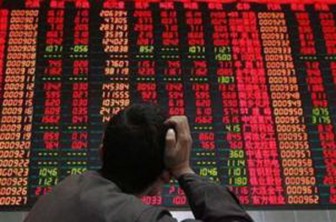 TOKYO (Reuters) – Asian shares rose and the yen was pressured on Wednesday, as risk appetite recovered slightly after European equities and the euro firmed overnight while U.S. financial markets looked set to resume trading with the passage of a powerful storm.
TOKYO (Reuters) – Asian shares rose and the yen was pressured on Wednesday, as risk appetite recovered slightly after European equities and the euro firmed overnight while U.S. financial markets looked set to resume trading with the passage of a powerful storm.
The MSCI index of Asia-Pacific shares outside Japan was up 0.2 percent after touching a two-week low on Tuesday.
Australian shares rose 0.5 percent as a rebound in copper prices boosted miners, while South Korean shares climbed 0.7 percent. Japan’s Nikkei average rose 0.8 percent, bouncing back from profit-taking after the central bank eased in line with expectations.
European shares rose on Tuesday on a slew of shareholder-friendly corporate news including a dividend hike plan from oil major BP as well as plans by Swiss bank UBS to cut 10,000 jobs, while the euro was helped by a slightly less-than-expected contraction in Spanish economy in July-September.
Elsewhere in Asia, Indonesia’s benchmark index closed at a record high on Tuesday as strong quarterly earnings from banks such as Bank Mandiri helped lift sentiment, and Malaysia marked a record close for the fourth straight session as investors piled into banking stocks.
The yen came off a one-week high of 79.275 yen against the dollar hit on Tuesday when the Bank of Japan’s latest easing measures spurred players to close their yen short positions. The dollar was last trading 0.1 percent higher at 79.66 yen.
“Concerns over Japan’s fiscal problems and deteriorating trade balance are behind the current phase of yen weakness and the BOJ easing is just one catalyst, said Yuji Saito, director of foreign exchange at Credit Agricole in Tokyo.
“So having cleared the post-BOJ positions, the dollar/yen will likely steady ahead of the U.S. jobs data and the U.S. presidential election,” he added.
The yen eased 0.1 percent against the euro at 103.26 yen and was down 0.2 percent against the Australian dollar at 82.58 yen.
Saito said dollar/yen resistance was seen at 80.50 to 80.60 yen, a 50 percent retracement of the 2012 high of 84.187 hit in March and the year’s low of 77.13 touched in September.
U.S. bond and major U.S. stock exchanges will resume trading on Wednesday, after New York was hit by Sandy, the worst storm to hit the metro area in 75 years.
The euro inched up 0.1 percent to $1.2963 on Wednesday, also helped by Italy selling 7 billion euros of new five- and 10-year government bonds at its lowest cost since May 2011. A report showing U.S. single-family home prices rose in August also supported sentiment.
But it stuck to its $1.2800/$1.3200 range seen since mid-September and traders said the single currency was unlikely to break out of that range until fresh news emerged from Europe to provide clear progress in its debt crisis management.
Spain’s Prime Minister Mariano Rajoy has yet to apply for an external rescue which would initiate the European Central Bank’s bond buying programme to ease borrowing strains.
Euro zone finance ministers will hold a conference call on Wednesday to discuss progress in negotiations of the revised Greek bailout but are not expected to make any decisions yet, two euro zone officials said on Tuesday.
Global lenders have yet to give Greece another tranche of bailout, but Greece moved closer to securing parliamentary approval for severe austerity reforms after an overwhelming majority of Greek Socialist lawmakers have agreed to vote in favour of the measures.
Oil prices steadied, with U.S. crude futures nearly flat at $85.74 a barrel and Brent at around $109.07.
Concerns about diminished demand for transportation fuel as Sandy paralyzed much of the U.S. East Coast region had weighed on oil prices as the region consumes an estimated 5.2 million barrels per day of fuel, about a quarter of the nation’s total.
(Editing by Edwina Gibbs)
Source: Reuters

























